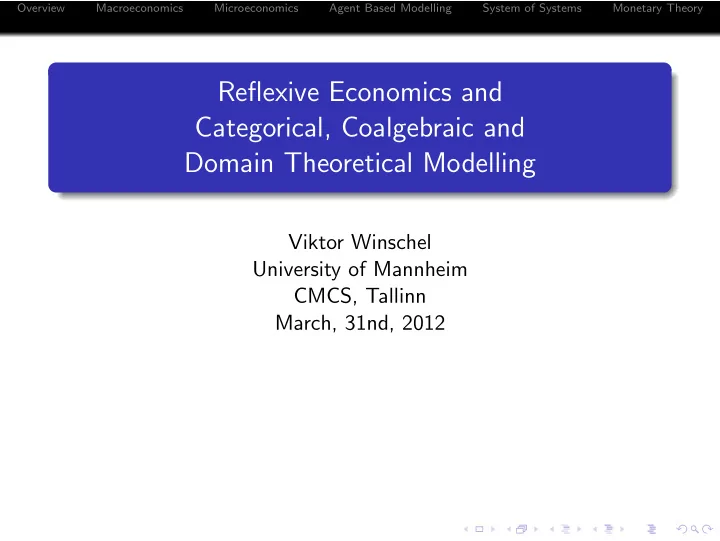

Overview Macroeconomics Microeconomics Agent Based Modelling System of Systems Monetary Theory Reflexive Economics and Categorical, Coalgebraic and Domain Theoretical Modelling Viktor Winschel University of Mannheim CMCS, Tallinn March, 31nd, 2012
Overview Macroeconomics Microeconomics Agent Based Modelling System of Systems Monetary Theory Content Macroeconomics Microeconomics Agent Based Modelling
Overview Macroeconomics Microeconomics Agent Based Modelling System of Systems Monetary Theory Endogeneize, Unify and Semantify Economics ... the agents in the model should be able to forecast and profit-maximize and utility-maximize as well as the economist - or should we say the econometrician - who constructed the model. T. Sargent Paradigmatic change, Nonreductionistic social sciences beyond physical analogies modeller in the modelled system, look from within system endogenize control, self-organization content - context (institutional genesis, dynamics) unify different mathematical approaches formal semantics for modelling language behavioral versus state based modelling What is money? What is decentralized self-organization?
Overview Macroeconomics Microeconomics Agent Based Modelling System of Systems Monetary Theory Macroeconomics Difference and differential equations V 0 = � ∞ t =0 β t U t = U 0 + � ∞ t =1 V t ⇒ f ( s t , x t , Eh ( s t +1 , x t +1 , e t ) = 0 ⇒ x ∗ ( s t ) ⇒ s t +1 = g ( s t , x t , e t ) ⇒ s t +1 = g ∗ ( s t , e t ) recursive dynamics, bubbles (infinite period?) state is density parallel processes stock-flow problem (differential / difference equations) hierarchical / emergent properties rational expectation /anticipation Coalgebraic stream calculus, domain theory, category theory
Overview Macroeconomics Microeconomics Agent Based Modelling System of Systems Monetary Theory Microeconomics There is thus a back-coupling or feedback between the theory and the object of the theory, an interrelation which is definitely lacking in the natural sciences. O. Morgenstern Interactive game theory beliefs of beliefs modal logic Brandenburger paradox (AbBaAbBa ⊥ ⇒ ? AbBa ⊥ ) rules to change rules (Rawl’s theory of justice) games over games (institutions) preferences over preferences (habit / culture formation) ... extensional / intensional functions Coalgebras, domain theory, game semantics
Overview Macroeconomics Microeconomics Agent Based Modelling System of Systems Monetary Theory Agent Based Modelling The problems which [the social sciences] try to answer arise only in so far as the conscious action of many men produce undesigned results, in so far as regularities are observed which are not the result of anybodys design. If social phenomena showed no order except in so far as they were consciously designed, there would indeed be no room for theoretical sciences of society and there would be, as is often argued, only problems of psychology. F. Hayek
Overview Macroeconomics Microeconomics Agent Based Modelling System of Systems Monetary Theory Agent Based Modelling Emergent properties object orientation (without semantics) system behavior by induction from simulated data formal behavior of parts and system epistemic and ontological states path dependency (infinite history) endogeneous grid = context dynamics integrate with difference equations + modal logic Coalgebras, domain theory, category theory, parallel semantics
Overview Macroeconomics Microeconomics Agent Based Modelling System of Systems Monetary Theory System Biological autopoiesis (self-production, self-repair, reproduction) what is organization (closure)? Kleene’s intentional fix point system’s model of itself anticipation, adaptation systemically important units theory of firm / institutions by complexification Category theory, self-participating universals, Hierarchies, dynamic reference frames, properties by embedding
Overview Macroeconomics Microeconomics Agent Based Modelling System of Systems Monetary Theory Monetary Theory What is money? What is economic value? no units in economic models, type theory double accounting: measure parallel processes early process logic money: accounting in space and time expectation / trust value: sequential / parallel independence value: emergent network property Monetary theory, currency unions, world financial system Beyond: theory of self-organization: democracy
Recommend
More recommend